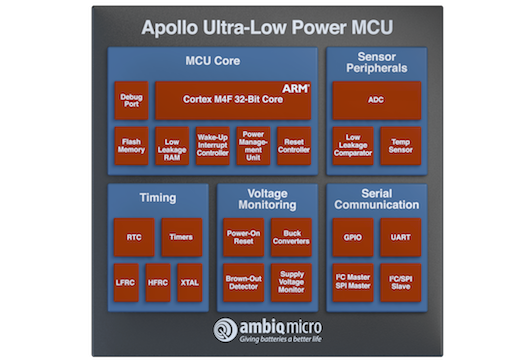Last year Ambiq Micro unveiled their Apollo Cortex-M4F MCU with Cortex M0+ energy efficiency thanks to operation in sub-threshold voltage (< 0.5 V), and the MCU is said found in Matrix Powerwatch, a fitness tracker powered by body heat that you never need to charge. The company has recently announced a new version of the micro-controller with Apollo 2 MCU with better maximum performance thanks to a higher maximum clock speed (48 MHz vs 24 MHz), and higher efficiency (10 μA/MHz vs 30 μA/MHz @ 3.3V).
Apollo 2 MCU key features and specifications:
- Ultra-low supply current
- <10 μA/MHz executing from flash at 3.3 V
- <10 μA/MHz executing from RAM at 3.3 V
- ARM Cortex-M4 Processor up to 48 MHz with FPU, MMU, wake-up interrupt controller with 32 interrupts
- Ultra-low power memory
- Up to 1 MB of flash memory for code/data
- Up to 256 KB of low leakage RAM for code/data
- 16kB 1 or 2-way Associative Cache
- Ultra-low power interface for off-chip sensors
- 14 bit, 15-channel, up to 1.2 MS/s ADC
- Voltage comparator
- Temperature sensor with +/-2ºC accuracy
- Serial peripherals – 6x I2C/SPI master,1x I2C/SPI slave,2x UART, PDM for mono and stereo audio microphone
- Clock sources
- 32.768 kHz XTAL oscillator
- Low frequency RC oscillator – 1.024 kHz
- High frequency RC oscillator – 48 MHz
- RTC based on Ambiq’s AM08X5/18X5 families
- Wide operating range – 1.8-3.6 V, –40 to 85°C
- Package – 2.5 x 2.5 mm 49-pin CSP with 34 GPIO; 4.5 x 4.5 mm 64-pin BGA with 50 GPIO
The MCU promises weeks, months, and years of battery life thanks to Ambiq Micro’s patented Subthreshold Power Optimized Technology (SPOT) Platform. Apollo 2 will be suitable for battery operated devices, or even batteryless devices leveraging energy harvesting such as wireless sensors, activity and fitness trackers, consumer medical devices, smart watches, and smart home/IoT devices.
Documentation and devkits are available but you’d need to contact the company to learn more. Ambiq Micro’s Apollo 2 is currently sampling to some partners, and will be sampling more broadly in the coming months. A few more details may be found on Ambiq Micro Apollo 2’s product page.

Jean-Luc started CNX Software in 2010 as a part-time endeavor, before quitting his job as a software engineering manager, and starting to write daily news, and reviews full time later in 2011.
Support CNX Software! Donate via cryptocurrencies, become a Patron on Patreon, or purchase goods on Amazon or Aliexpress





